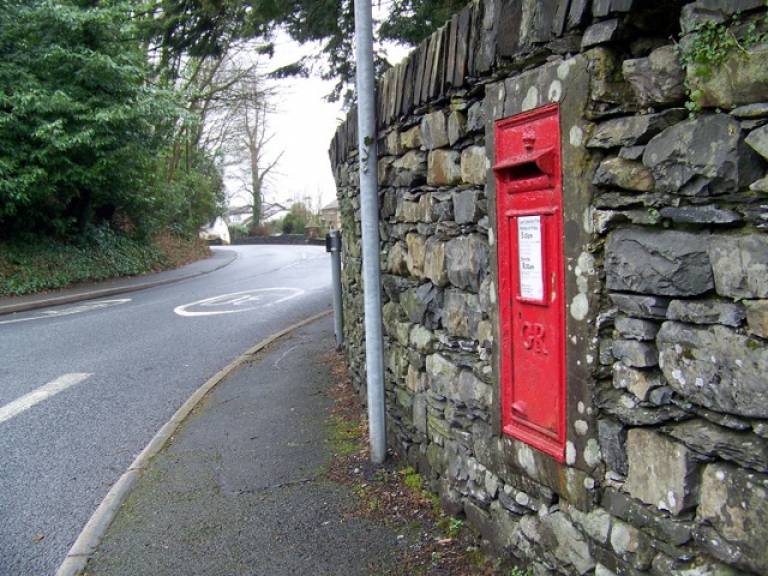UCL Centre for Ethics and Law hosts event on Justice for Sub-postmasters in the Post Office case
10 June 2021
The online event focused on how justice was secured for the maligned Post Office sub-postmasters, with contributions by a number of those who acted in the case.

Image credit: Postbox, Hodgehowe by Maigheach-gheal, CC BY-SA 2.0, via Wikimedia Commons
On 7 June, the Centre for Ethics and Law at UCL Laws held an online event on ‘Justice for Sub-postmasters in the Post Office case: Lessons for Criminal Justice, Ethics and Corporate Control and Governance’. The importance of the issues raised by the actions of the Post Office to prosecute innocent sub-postmasters was evident in the passion and expertise of the panel of speakers, with almost 400 people registered to attend the event.
The facts, which have been widely reported, record actions by the Post Office being labelled by, among others, the Criminal Cases Review Commission, as ‘an affront to the public conscience’.
The result is that over some 20 years, several hundred sub-postmasters and Crown Office employees were wrongly convicted of theft and false accounting and many were imprisoned. Hundreds of thousands of pounds have been incorrectly and improperly taken by the Post Office from these individuals. The result is that many lives have been destroyed, and a number of the post office workers have died with convictions against their names - one reportedly by their own hand.
Many of the facts came out in two sets of Parliamentary Select Committee hearings and two major court cases. The most recent of these was a Court of Appeal decision in April this year to quash the convictions of thirty-nine former Post Office workers. On 19 May, Paul Scully, a government minister, announced that there would be an independent inquiry under the provisions of the Inquiries Act 2005 under the chairmanship of Sir Wyn Williams.
The expert panelists, three of whom had provided pro bono representation in the recent court cases to former Post Office workers, gave their trenchant views and answered a range of questions provided by the audience. This included concerns expressed about the apparent poor corporate governance and culture at the Post Office. There was also criticism of the deleterious role of the Post Office as both an investigator and criminal prosecutor, since not only did the appellants not receive a fair trial based on IT evidence; but that it was also unfair to try them. The Post Office allegations were based on systematic errors pointing to fundamental issues with the computer systems, and the investigation and prosecution process.
Other speakers questioned the actions of Post Office general counsel and other in-house and external legal advisers, the position of ICL/Fujitsu, and separately, the sponsoring government department. Possible issues remain unresolved in relation to inadequacies in the risk assessment and reporting arrangements within the Post Office and the role of its internal audit function. These are key questions underpinning the apparent defective culture and ethics within the Post Office, evidenced by among other things, by fundamental failings in the understanding of disclosure requirements in criminal cases.
More broadly the cases indicated an apparent lack of experience of judges and the corporate board in understanding technology and the use of computer sourced information as evidence in court.
The event has been recorded and can be viewed now:
Further, a number of speakers have generously provided transcripts of their speech, which are available to view:
- Law, lawyers, life and death-- in the Post Office Scandal 1999—2021 by Nick Gould
- The Post Office Scandal (LinkedIn post with a link to the transcript) by Paul Marshall
For useful resources to consult regarding the case, see:
- Resources
Hamilton and ors. v Post Office Ltd [2021] EWCA Crim 577. https://www.bailii.org/ew/cases/EWCA/Crim/2021/577.html
Bates and ors. v Post Office Ltd (‘Horizon Issues’) Rev 1 [2019] EWHC 3408 QB. https://www.bailii.org/ew/cases/EWHC/QB/2019/3408.html
Bates and ors. v Post Office Ltd (‘Common Issues’) [2019] EWHC 606 QB. https://www.bailii.org/ew/cases/EWHC/QB/2019/606.html
Post Office Ltd v Castleton [2007] EWHC 5 QB. https://www.bailii.org/ew/cases/EWHC/QB/2007/5.html
Recommendations for the probity of computer evidence, Marshall, Christie, Ladkin, Littlewood, Mason, Newby, Rogers, Thimbleby, Thomas, Digital Evidence and Electronic Signature Law Review 18 (2021) 18 https://journals.sas.ac.uk/deeslr/article/view/5240/5083 (The published version of a paper submitted to the Under Secretary of State for Justice in November 2020.)
Stephen Mason and Daniel Seng (Eds.) Electronic Evidence 4th Edition, Institute of Advanced Legal Studies for the SAS Humanities Digital Library, School of Advanced Study University of London 2017, https://humanities-digital-library.org/index.php/hdl/catalog/book/electronicevidence (5th edition forthcoming 2021).
The Law Commission presumption concerning the dependability of computer evidence, Ladkin, Littlewood, Thimbleby, Thomas, Digital Evidence and Electronic Signature Law Review 17 (2020) 1. https://journals.sas.ac.uk/deeslr/article/view/5143
‘Robustness of software’, Peter Ladkin, Digital Evidence and Electronic Signature Law Review 17 (2020) 15. https://journals.sas.ac.uk/deeslr/article/view/5171/5036
English law’s presumption that computer systems are reliable: time for a rethink? Paul Marshall, Butterworths Journal of International Banking and Financial Law, 7 (2020) 433.
BBC Radio 4, 11-part Podcast by Nick Wallis, The Great Post Office trial https://www.bbc.co.uk/programmes/m000jf7j/episodes/downloads
The Guardian Podcasts on Janet Skinner’s experience, by Anushka Asthana and Richard Brooks
https://www.theguardian.com/news/audio/2021/may/10/exposing-the-great-post-office-scandal-part-1
https://www.theguardian.com/news/audio/2021/may/11/the-post-office-scandal-part-2
The harm that judges do – misunderstanding computer evidence: Mr Castleton’s story, Paul Marshall, Digital Evidence and Electronic Signature Law Review 17 (2020) 25.
https://journals.sas.ac.uk/deeslr/article/view/5172/5037
English judges prefer bankers to nuns: changing ethics and the Plover bird Paul Marshall (2019) 8 JIBFL 505 https://www.appgbanking.org.uk/wp-content/uploads/2020/02/English_judges_prefer_bankers_to_nuns_chang.pdf
The Hearsay Rule in Civil Proceedings 1993 Law Com. No. 245.
Evidence in Criminal Proceedings Hearsay and Related Topics 1997 Law Com. No. 216.
The importance of all these issues and the current inquiry reinforce the need for further events, which the Centre for Ethics and Law looks forward to hosting, as more concerns are identified and made public.
 Close
Close

